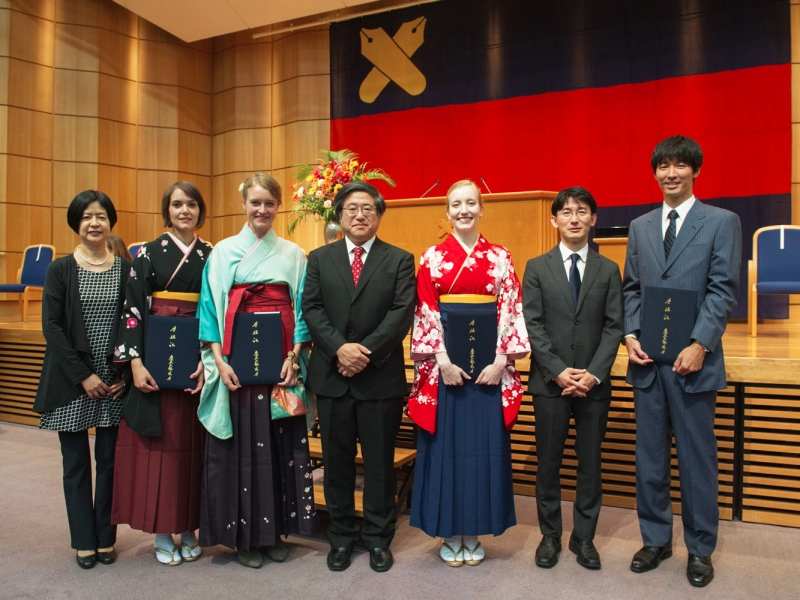
Shaping change
Willy Brandt School of Public Policy
A business mindset and application-oriented analytical methods are in demand not only in the private sector. They are also used by decision makers in not-for-profit organizations, who thus promote sociopolitical change. The Haniel Foundation has therefore been lending its support to the Willy Brandt School of Public Policy since the school was founded.
Entrepreneurial thinking and applied analytical skills are in demand not only in the private enterprise sector. Decision makers in non-profit organizations deploy them as well – and thus promote social and political change. Since 2002, the Willy Brandt School of Public Policy has imparted these skills in a two-year, internationally focused Master’s degree. From the very beginning, the Haniel Foundation has provided support. In its role as strategic partner and sponsor, it has helped the Brandt School become one of the leading professional schools in Europe.
Together at the top
At the Willy Brandt School of Public Policy, young people from all over the world prepare themselves for a career – be it in politics, civil service or in international companies. To gain their degree as a Master of Public Policy, they attend seminars on different subjects, which include internships. Every year, approximately 50 graduates take up the English-language postgraduate course.
Strategic partnership in three pillars
The cooperation between the Brandt School and the Haniel Foundation is divided into three pillars. The first pillar is institutional support. Since 2008, the Haniel Foundation has (part-) financed the strategically important Franz Haniel Chair of Public Policy. In addition, since 2012 the Haniel Foundation has supported the Aletta Haniel Professorship for Public Policy and Entrepreneurship. In this way, the Haniel Foundation has made a key contribution to the further development of the Willy Brandt School in terms of content. The second line of support, the Haniel cooperation programmes, allows the Willy Brandt School to strengthen its international links to other universities. For instance, a Haniel Spring or Fall School has been held in cities in the Central and Eastern Europe and CIS regions each year since 2010. In 2010 and 2011 the school was held in Moscow, in 2012 it was in St. Petersburg, and in 2013 the participants travelled to Novosibirsk. With the third pillar, the Haniel scholarship programmes at the Willy Brandt School, since 2012 the Haniel Foundation has sponsored cost of living allowances for students from CEE and CIS (Haniel Scholarships) and tuition-free scholarships for applicants from Germany, the EU and North America (Haniel Stipends).
You can find more information here.
LIST OF REFERENCES
Benz, Arthur (2003): Politologische Verwaltungsforschung. In: Verwaltungswissenschaften und Verwaltungswissenschaft. Forschungssymposium anlässlich der Emeritierung von Klaus König, hrsg. von Jan Ziekow, Berlin: Duncker & Humblot (Schriftenreihe der Hochschule Speyer 159), S. 77–82.
Dye, Thomas R. (1972): Understanding Public Policy. Englewood Cliffs, New Jersey: Pearson Education.
Grimm, Heike (2010): Entrepreneur – Social Entrepreneur – Policy Entrepreneur. Typologische Merkmale und Perspektiven. In: Zeitschrift für Politikberatung, Jg. 3, H. 3–4, S. 441–456.
Hennis, Wilhelm (1965): Aufgaben einer modernen Regierungslehre. In: Politische Vierteljahresschrift, Heft 6, S. 422–441.
Hennis, Wilhelm (2000): Rat und Beratung im modernen Staat. In: Politikwissenschaft und Politisches Denken, hrsg. von Wilhelm Hennis, Tübingen: Mohr Siebeck, S.161–176.
Howlett, Michael / Ramesh, M. / Perl, Anthony (2009): Studying Public Policies. Policy Cycles and Policy Subsystems. Don Mills: Oxford University Press.
Lasswell, Harold Dwight (1951): The Policy Orientation. In: The Policy Sciences, hrsg. von Daniel Lerner und Harold Dwight Lasswell, Palo Alto, Kalifornien: Stanford University Press, S. 3–15.
Lasswell, Harold Dwight (1956): The Decision Process. Seven Categories of Functional Analysis. College Park: University of Maryland Press.
Mayntz, Renate / Scharpf. Fritz W. (1995): Gesellschaftliche Selbstregelung und politische Steuerung. Frankfurt am Main: Campus Verlag.
Osborne, David / Gaebler, Ted (1993): Reinventing Government: How the Entrepreneurial Spirit is Transforming the Public Sector. New York: Penguin Books.
Schuppert, Gunnar Folke (2003): Ist Verwaltungs(Staats)wissenschaft möglich? Überlegungen am Beispiel des Werkes von Klaus König. In: Verwaltungswissenschaften und Verwaltungswissenschaft. Forschungssymposium anlässlich der Emeritierung von Klaus König, hrsg. von Jan Ziekow, Berlin: Duncker & Humblot (Schriftenreihe der Hochschule Speyer 159), S. 15–41.
Aletta Haniel Professorship of Public Policy and Entrepreneurship

© Michael Hudler
Thinking along new lines
Prof. Heike Grimm became Deputy Director of the Willy Brandt School of Public Policy at the University of Erfurt in 2011, and has been its Director since June 2015. She has been the Aletta Haniel Professor for Public Policy and Entrepreneurship since 2013. Previously, she worked as Professor for Policy Analysis and Public Management at the University of Malta. She politics, economics, economic history and Arabic at the University of Munich and the School of Oriental and African Studies at the University of London. In 1997, she received her doctorate from LMU Munich, and gained her postdoctoral qualification from the University of Erfurt in 2013.
Franz Haniel Chair of Public Policy
From 2010/11 to 2016, the Franz Haniel Chair of Public Policy was occupied by Prof Florian Hoffmann, an expert in international and human rights law as well as in the theory of international law.
Another chair, the »Gerhard Haniel Chair for Public Policy and International Development«, will follow in 2016. The three endowed chairs are making reference to the three key founding members of the Haniel company, representing the Haniel family’s future-oriented and entrepreneurial spirit. It is with great enthusiasm that the Willy Brandt School’s professors – Prof. Dr Heike Grimm, director, Prof. Dr Frank Ettrich (director 2009 – 2012) and Prof. Dr Florian Hoffmann (director 2012 – 2015) as well as founding director Prof. Dr Dietmar Herz and Jun. Prof. Dr Solveig Richter – train future leaders from more than 50 countries.





